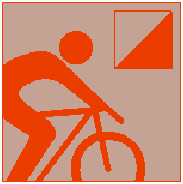
6.2 Content

Mountain bike orienteering takes place on the track and path network and involves as a basic element complex route choice problems, including the estimating of height differences. It is obvious that the map must concentrate on clearly depicting these features. The map must also be legible when cycling at high speed. This means that the map should omit a large number of details in "free" terrain in order to exaggerate the track and path network and to simplify the presentation of the shape of the ground. Only details that impact a) route choice and b) navigation and positioning, need be shown on the map.
In order to accomplish fairness in route choice, additional symbols need to be introduced. These symbols describe the quality and width of the tracks and paths.











